text
Literature
Why Chicken Means So Much to Me
It may seem like an empty stomach is the worst thing about being poor, but for Junior it’s not being able to save his best friend.
July 5, 2014


